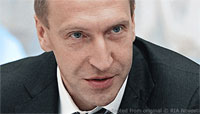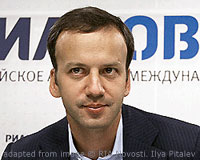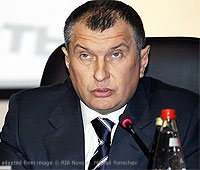Cabinet changes fail to impress investors
Natasha Doff - Moscow News - themoscownews.com - 5.23.12 - JRL 2012-94
The long-awaited Cabinet reshuffle announced by President Vladimir Putin on Monday will help to bring stability to volatile Russian markets, but has done little else to impress investors, analysts said.
The biggest government reshuffle in years, Monday's announcement ushered in a host of new faces to the Cabinet, renewing around two-thirds of the 28 seats, but leaving the same ministers in the key positions of finance, foreign policy and defense.
The new Cabinet enters office as rocky global markets, falling oil prices and rising opposition to Putin's rule have boosted capital flight, making it imperative for the Cabinet to convince investors that Russia is serious about passing much-needed economic reforms.
Market-friendly faces
 The nominations certainly make a stab in this direction. Several market-friendly figures have been awarded places in the new Cabinet, including the liberal-minded Igor Shuvalov and Arkady Dvorkovich, both of whom were made deputy prime ministers.
The nominations certainly make a stab in this direction. Several market-friendly figures have been awarded places in the new Cabinet, including the liberal-minded Igor Shuvalov and Arkady Dvorkovich, both of whom were made deputy prime ministers.
"Dvorkovich and Shuvalov are good, market-friendly names. They have a very good reputation amongst market participants for wanting to improve the investment climate," Bruce Bower, partner at Verno Capital, told The Moscow News.
 The finance and economic development minister jobs were taken by two low-key, but respected figures, with former Finance Minister Anton Siluanov retaining his post, and former Deputy Economic Development Minister Andrei Belousov moving up to the top spot in that ministry.
The finance and economic development minister jobs were taken by two low-key, but respected figures, with former Finance Minister Anton Siluanov retaining his post, and former Deputy Economic Development Minister Andrei Belousov moving up to the top spot in that ministry.
But analysts are skeptical about how much power these figures will hold in the everyday running of things. Putin announced on Tuesday that many of the former Cabinet ministers would be made into presidential aides, suggesting that the power base will simply shift with Putin from the White House to the Kremlin.
"Some people have been frustrated by the changes we saw on Tuesday that people who appeared to have left the government have simply been relocated," Vyacheslav Smolyaninov, strategist at Uralsib investment bank, told The Moscow News. "For many investors who were betting on changes, that will not be very encouraging."
Sechin rules the day
 The weight Dvorkovich will hold in his new position of deputy prime minister in charge of industry and energy has also been called into question by Tuesday's appointment of his predecessor, Putin-ally Igor Sechin, as chairman of Rosneft, the country's biggest oil company.
The weight Dvorkovich will hold in his new position of deputy prime minister in charge of industry and energy has also been called into question by Tuesday's appointment of his predecessor, Putin-ally Igor Sechin, as chairman of Rosneft, the country's biggest oil company.
Sechin, dubbed Russia's "energy tsar," has long held a tight grip on the strategic energy sector, which analysts say he is unlikely to relinquish to Dvorkovich.
A nearly 2 percent rise in Rosneft's share price on Tuesday indicates that investors are viewing Sechin's new job positively, most likely due to the stability it will bring to the sector. But the fact that Dvorkovich has been placed in a more or less redundant post could be bad news for the economic modernization process investors hoped he would promote, analysts said.
"The key question markets have is whether or not the Cabinet will be able to propose an economic agenda that would help to reduce dependence on the oil price," Natalia Orlova, chief economist at Alfa-Bank, told The Moscow News. "The Cabinet will be very good at maintaining stability and building up the reserve fund, but I don't get the impression that it will propose a proactive reform agenda."
Litmus test
Analysts say the litmus test for investors on how committed to reform the new Cabinet is will be its handling of plans to sell some $30 billion worth of stakes in state assets by 2014.
Prime Minister Dmitry Medvedev stressed his commitment to the program in a speech following the nomination of the new Cabinet on Monday, and a revised privatization plan is expected to be drawn up within the next week.
Analysts are skeptical, however about how far the government will go in fulfilling its promises on the issue. Many in Putin's new band of presidential aides, as well as Sechin, have voiced opposition to plans to privatize firms in some strategic sectors, such as energy.
On Tuesday, Putin signed a decree that places electricity firms RusHydro, the Federal Grid Company, MRSK Holding and System Operator on a list of strategic companies, meaning they can only be privatized under presidential decree. All four companies were listed on the government's previous privatization plan.
Jochen Wermuth, chief investment officer at Wermuth Asset Management, an investment advisor with an office in Moscow, said that investors' views on Russia would only really change if bigger structural reforms are implemented.
"It is good news that the new government has some experienced liberal-minded people in it, like Shuvalov and Dvorkovich," Wermuth told The Moscow News. "However, rule of law and an independent judiciary is what needs to be established and a genuine war against corruption declared for these people to be effective."
Keywords: Russia, Government, Politics - Russian News - Russia
The long-awaited Cabinet reshuffle announced by President Vladimir Putin on Monday will help to bring stability to volatile Russian markets, but has done little else to impress investors, analysts said.
The biggest government reshuffle in years, Monday's announcement ushered in a host of new faces to the Cabinet, renewing around two-thirds of the 28 seats, but leaving the same ministers in the key positions of finance, foreign policy and defense.
The new Cabinet enters office as rocky global markets, falling oil prices and rising opposition to Putin's rule have boosted capital flight, making it imperative for the Cabinet to convince investors that Russia is serious about passing much-needed economic reforms.
Market-friendly faces
 The nominations certainly make a stab in this direction. Several market-friendly figures have been awarded places in the new Cabinet, including the liberal-minded Igor Shuvalov and Arkady Dvorkovich, both of whom were made deputy prime ministers.
The nominations certainly make a stab in this direction. Several market-friendly figures have been awarded places in the new Cabinet, including the liberal-minded Igor Shuvalov and Arkady Dvorkovich, both of whom were made deputy prime ministers.
"Dvorkovich and Shuvalov are good, market-friendly names. They have a very good reputation amongst market participants for wanting to improve the investment climate," Bruce Bower, partner at Verno Capital, told The Moscow News.
 The finance and economic development minister jobs were taken by two low-key, but respected figures, with former Finance Minister Anton Siluanov retaining his post, and former Deputy Economic Development Minister Andrei Belousov moving up to the top spot in that ministry.
The finance and economic development minister jobs were taken by two low-key, but respected figures, with former Finance Minister Anton Siluanov retaining his post, and former Deputy Economic Development Minister Andrei Belousov moving up to the top spot in that ministry.
But analysts are skeptical about how much power these figures will hold in the everyday running of things. Putin announced on Tuesday that many of the former Cabinet ministers would be made into presidential aides, suggesting that the power base will simply shift with Putin from the White House to the Kremlin.
"Some people have been frustrated by the changes we saw on Tuesday that people who appeared to have left the government have simply been relocated," Vyacheslav Smolyaninov, strategist at Uralsib investment bank, told The Moscow News. "For many investors who were betting on changes, that will not be very encouraging."
Sechin rules the day
 The weight Dvorkovich will hold in his new position of deputy prime minister in charge of industry and energy has also been called into question by Tuesday's appointment of his predecessor, Putin-ally Igor Sechin, as chairman of Rosneft, the country's biggest oil company.
The weight Dvorkovich will hold in his new position of deputy prime minister in charge of industry and energy has also been called into question by Tuesday's appointment of his predecessor, Putin-ally Igor Sechin, as chairman of Rosneft, the country's biggest oil company.
Sechin, dubbed Russia's "energy tsar," has long held a tight grip on the strategic energy sector, which analysts say he is unlikely to relinquish to Dvorkovich.
A nearly 2 percent rise in Rosneft's share price on Tuesday indicates that investors are viewing Sechin's new job positively, most likely due to the stability it will bring to the sector. But the fact that Dvorkovich has been placed in a more or less redundant post could be bad news for the economic modernization process investors hoped he would promote, analysts said.
"The key question markets have is whether or not the Cabinet will be able to propose an economic agenda that would help to reduce dependence on the oil price," Natalia Orlova, chief economist at Alfa-Bank, told The Moscow News. "The Cabinet will be very good at maintaining stability and building up the reserve fund, but I don't get the impression that it will propose a proactive reform agenda."
Litmus test
Analysts say the litmus test for investors on how committed to reform the new Cabinet is will be its handling of plans to sell some $30 billion worth of stakes in state assets by 2014.
Prime Minister Dmitry Medvedev stressed his commitment to the program in a speech following the nomination of the new Cabinet on Monday, and a revised privatization plan is expected to be drawn up within the next week.
Analysts are skeptical, however about how far the government will go in fulfilling its promises on the issue. Many in Putin's new band of presidential aides, as well as Sechin, have voiced opposition to plans to privatize firms in some strategic sectors, such as energy.
On Tuesday, Putin signed a decree that places electricity firms RusHydro, the Federal Grid Company, MRSK Holding and System Operator on a list of strategic companies, meaning they can only be privatized under presidential decree. All four companies were listed on the government's previous privatization plan.
Jochen Wermuth, chief investment officer at Wermuth Asset Management, an investment advisor with an office in Moscow, said that investors' views on Russia would only really change if bigger structural reforms are implemented.
"It is good news that the new government has some experienced liberal-minded people in it, like Shuvalov and Dvorkovich," Wermuth told The Moscow News. "However, rule of law and an independent judiciary is what needs to be established and a genuine war against corruption declared for these people to be effective."